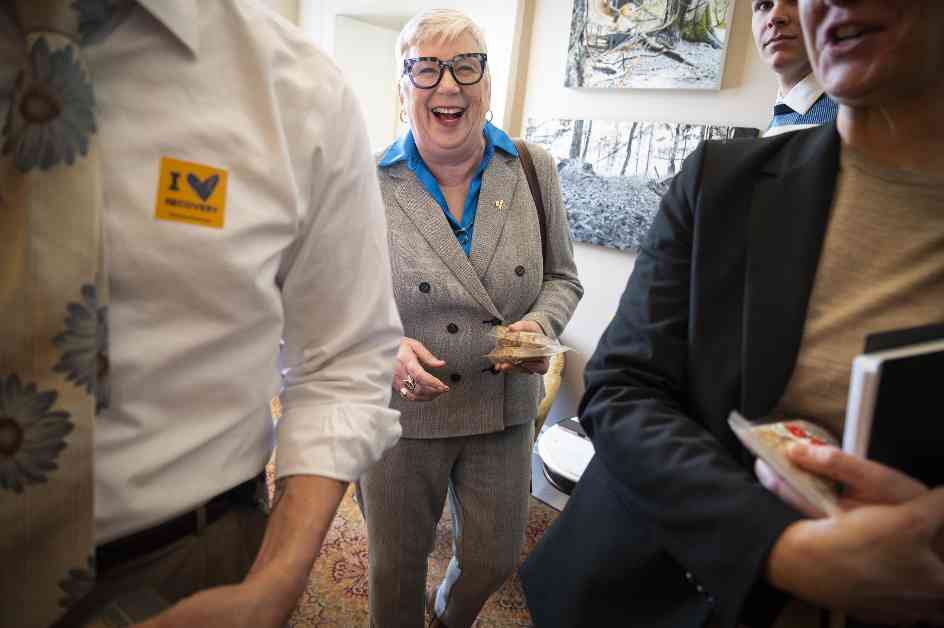Canada’s Top Diplomat Visits Montpelier Amid Fraying Relations
In the midst of escalating tensions between the United States and Canada, Canadian consul general Bernardette Jordan made a high-profile visit to Montpelier on Wednesday, Feb. 19. As trade disputes loom and political rhetoric intensifies, the relationship between these neighboring nations is under strain, with President Donald Trump and his supporters hinting at potential annexation plans for Canada.
Amidst this backdrop, the visit by Jordan, Canada’s Consul General in New England, takes on added significance. The atmosphere of uncertainty and division has sparked a backlash in Canada, with calls for boycotting U.S. goods and canceling travel plans to America. Recent incidents, such as fans in Montreal booing the “Star-Spangled Banner” at a hockey tournament game, underscore the growing rift between the two countries.
In a candid conversation with VTDigger, Jordan expressed her dismay at the derogatory “51st state” comments and emphasized the pride Canadians have in their country. Despite the inflammatory rhetoric coming from the White House, she remains optimistic about the enduring strength of the U.S.-Canada alliance. “Our relationship has been so strong for so long,” Jordan remarked, highlighting the deep-rooted ties that bind the two nations.
Strengthening Bonds in Montpelier
During her visit to the Statehouse in Montpelier, Jordan engaged in a series of meetings with state lawmakers and officials to reaffirm the longstanding relationship between Vermont and Canada. Against the backdrop of looming tariffs imposed by President Trump, Jordan’s presence underscored the potential economic impact on Vermont, a state heavily reliant on trade with Canada.
Addressing the House Committee on Commerce and Economic Development, Jordan expressed her concerns about the looming tariffs and their implications for Vermont’s economy. With Canada being Vermont’s largest trading partner, the threat of trade disruptions poses a significant risk to the state’s economic well-being. The uncertainty surrounding the U.S.-Canada relationship has left lawmakers bewildered, with Rep. Michael Marcotte echoing the sentiments of many in questioning the future of this vital partnership.
As discussions unfolded in Montpelier, the specter of economic repercussions loomed large, prompting a sense of urgency among policymakers and stakeholders. The need to navigate this turbulent period and preserve the economic ties that bind Vermont and Canada remains a pressing priority.
Challenges and Opportunities in Public Transportation
Meanwhile, Vermont lawmakers are grappling with a proposal to restructure Green Mountain Transit’s bus services, a move that could have far-reaching implications for public transportation in the state. As financial woes plague the agency, the proposed shift of services outside Chittenden County to neighboring providers seeks to realign resources and enhance operational efficiency.
However, the proposed overhaul has encountered resistance from the union representing Green Mountain Transit’s drivers, who fear potential pay cuts and loss of benefits in the event of job transfers. The delicate balance between financial sustainability and employee welfare underscores the complexities of public transit reform, as policymakers seek to strike a harmonious equilibrium in service delivery.
Amidst these challenges, opportunities for innovation and improvement emerge, offering a glimmer of hope for a more resilient and responsive public transportation system in Vermont. The ongoing dialogue surrounding this proposal reflects the nuanced interplay of economic, social, and logistical factors that shape the future of public transit in the state.
In a dynamic political landscape marked by shifting alliances and evolving trade dynamics, the visit by Canada’s top diplomat to Montpelier serves as a poignant reminder of the enduring bonds that connect nations, transcending political rhetoric and economic uncertainties. As Vermont navigates the complexities of a changing world, the importance of fostering strong relationships with international partners like Canada takes on renewed significance. The shared history, values, and interests that underpin the U.S.-Canada alliance offer a beacon of hope amidst the stormy seas of diplomatic discourse and trade tensions.










